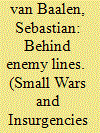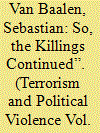| Srl | Item |
| 1 |
ID:
189356


|
|
|
|
|
| Summary/Abstract |
This article examines the conditions that foster state-insurgent cooperation in rebel governance. State-insurgent cooperation is puzzling because it can alienate hardliners, undermine the parties’ legitimacy, reveal sensitive information, and cause autonomy losses. We propose that conflict parties are more likely to discount these costs when they have overlapping civilian constituencies with high governance provision expectations. Analysing rebel governance in Côte d’Ivoire and Sri Lanka using original data, we find that civilian expectations prompt cooperation even when the parties appeal to separate constituencies. The article nuances existing theories of rebel governance and contributes new knowledge on state-insurgent interactions in civil war.
|
|
|
|
|
|
|
|
|
|
|
|
|
|
|
|
| 2 |
ID:
169927


|
|
|
|
|
| Summary/Abstract |
Many post-war states experience continuous low-intensity violence for years after the formal end of the conflict. Existing theories often focus on country-level explanations of post-war violence, such as the presence of spoilers or the nature of the peace agreement. Yet, post-war violence does not affect all communities equally; whereas some remain entrenched in violence, others escape the perpetuation of violent conflict. We argue that communities where wartime mobilization at the local level is based on the formation of alliances between armed groups and local elites are more likely to experience post-war violence, than communities where armed groups generate civilian support based on grassroots backing of the group’s political objectives. We explore this argument in a comparison of three communities in KwaZulu-Natal, South Africa, which have experienced different levels of post-war violence. The analysis supports the main argument and contributes to the research on the microdynamics of civil war by outlining the implications of certain strategies of wartime mobilization and how these may generate localized legacies.
|
|
|
|
|
|
|
|
|
|
|
|
|
|
|
|